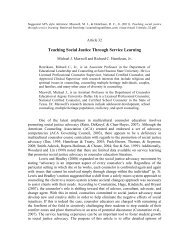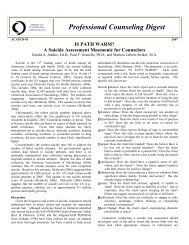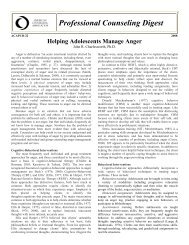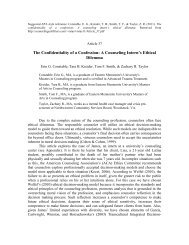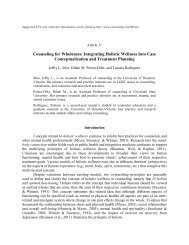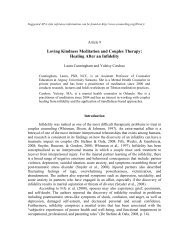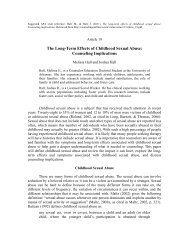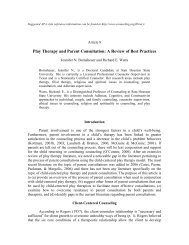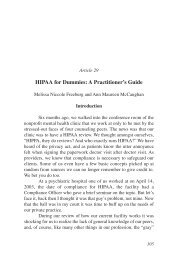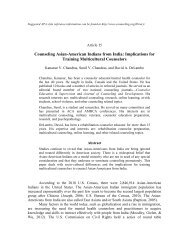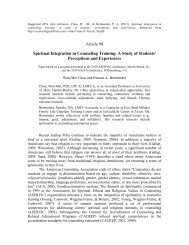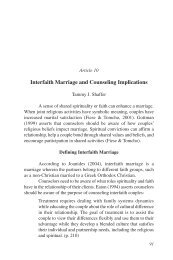Adapting counseling skills for multicultural and diverse clients.
Adapting counseling skills for multicultural and diverse clients.
Adapting counseling skills for multicultural and diverse clients.
- No tags were found...
Create successful ePaper yourself
Turn your PDF publications into a flip-book with our unique Google optimized e-Paper software.
<strong>Adapting</strong> Counseling Skills <strong>for</strong> Multicultural <strong>and</strong> Diverse Clientsunderst<strong>and</strong>ing stage <strong>skills</strong> of stating feelings <strong>and</strong> content, selfdisclosure, <strong>and</strong> asking concrete questions to be blunt <strong>and</strong> lackingdimension. Females may prefer a conversational style of <strong>counseling</strong>that allows them to express more personal <strong>and</strong> emotional feelings.In contrast, males may find the use of these <strong>skills</strong> beneficial to theirprogress in session, but may struggle to identify their emotions. Also,the underst<strong>and</strong>ing stage <strong>skills</strong> of asking <strong>for</strong> concrete <strong>and</strong> specificexpressions; immediacy; identifying problem situations, action taken,<strong>and</strong> feelings; <strong>and</strong> confronting in a caring way may be considered bymales to be overly intrusive <strong>and</strong> emotionally charged (Smaby &Maddux, in press). In either case, the counselor needs to monitor<strong>clients</strong>' personal communication styles <strong>and</strong> adjust use of theunderst<strong>and</strong>ing <strong>skills</strong> accordingly. If the counselor senses intimidation,withdrawal, or anxiety by the client, the counselor should provideample time <strong>and</strong> space to allow <strong>clients</strong> to express themselves in a waythat is com<strong>for</strong>table.Underst<strong>and</strong>ing Stage Skills With Lesbian, Gay, Bi-Sexual,or Transgender ClientsThe use of underst<strong>and</strong>ing stage <strong>skills</strong> with Lesbian, Gay,Bisexual, Transgender or (LGBT) <strong>clients</strong> may be considered toointrusive or direct, <strong>and</strong> may result in <strong>clients</strong> feeling vulnerable orattacked. Culturally competent counselors using these <strong>skills</strong> shouldconsider softening their delivery <strong>and</strong> tone. It is also important thatcounselors recognize that the mental health problems manifested bymembers of the LGBT community may not be due to LGBT identityitself (Smith, Foley, & Chaney, 2008). Counselors should alsoconsider the dual discrimination of persons of color who are alsomembers of the LGBT community <strong>and</strong> who experience challengesrelated to racism <strong>and</strong> heterosexism. In order to be effective in thetherapeutic setting with LGBT <strong>clients</strong>, the counselor mustconsistently communicate genuine empathy <strong>and</strong> support.39
Compelling Counseling Interventions<strong>Adapting</strong> Acting Stage Skills <strong>for</strong> Addressing Economic Class(E), Chronological Age (C) <strong>and</strong> Psychological Maturity (P)Economic ClassClients affected by poverty may be reluctant to participate in<strong>counseling</strong>. These <strong>clients</strong> often struggle with basic life needs <strong>and</strong>may view acting stage <strong>skills</strong> of deciding, choosing, <strong>and</strong> identifyingconsequences as impossible <strong>for</strong> them. Thus, <strong>clients</strong> with lowerincomes may require assistance in obtaining housing, food, <strong>and</strong>healthcare. Once these lower-level needs are met they may be moreable to focus on strategies to improve their psychological functioning(Smith et al., 2008). Conversely, <strong>clients</strong> with higher levels of incomemay find the <strong>skills</strong> in the acting stage helpful, but may also feel theneed to design their own interventions. For example, in regard tocontracting, <strong>clients</strong> may decide what steps are needed to improve asituation without suggestions from the counselor.Chronological AgeActing stage <strong>skills</strong> may be difficult <strong>for</strong> children who are age2 years <strong>and</strong> under due to their more limited cognitive <strong>and</strong> emotionaldevelopment. Exploring stage <strong>skills</strong> may be much more appropriate.However, acting stage <strong>skills</strong> can be adapted <strong>for</strong> use with childrenages 2 to 7 years. This can be achieved by proposing tentativehypotheses regarding decision-making <strong>and</strong> contracting as a way tonurture the development of higher-order thinking <strong>and</strong> exp<strong>and</strong>ingviewpoints. Children between the ages of 7 <strong>and</strong> 11 years may be ableto engage in acting stage <strong>skills</strong> if they are presented in a concretefashion. However, like younger children, they will requiresuggestions <strong>and</strong> assistance in contracting <strong>and</strong> decision-making <strong>skills</strong>.Play therapy, art therapy, <strong>and</strong> media may be useful tools in workingwith children <strong>and</strong> adolescents in <strong>counseling</strong>. Counselors should alsoconsult with parents <strong>and</strong> caregivers to assist young children in their<strong>counseling</strong> journey (Smaby & Maddux, in press).40
<strong>Adapting</strong> Counseling Skills <strong>for</strong> Multicultural <strong>and</strong> Diverse ClientsPsychological MaturityPsychological maturity as it relates to the acting stage <strong>skills</strong>are based on <strong>clients</strong>' stage of cognitive <strong>and</strong> emotional development.For example, in Kohlberg’s theory, those whose moral reasoning isat stages one or two obey rules of behavior based upon their fear ofpunishment or trading favors. Children at this stage may not fullybenefit from acting stage <strong>skills</strong> due to egocentricity. On the otherh<strong>and</strong>, children who have progressed to moral reasoning levels atstages three <strong>and</strong> four (good boy/good girl or law <strong>and</strong> order) may beable to view perceptions of self <strong>and</strong> others as important to goodrelationships <strong>and</strong> rule-following as necessary <strong>and</strong> important <strong>for</strong> thebetterment of all. A counselor can deliver acting stage <strong>skills</strong> bysuggesting tentative hypotheses that can be confirmed or denied bychildren. Children at the highest level of Kohlberg’s theory of moralreasoning (social contract or golden rule) may be able to initiateacting stage <strong>skills</strong> <strong>and</strong> the counselor should allow such children to usetheir higher levels of maturity as springboards <strong>for</strong> developingeffective coping strategies (Smaby & Maddux, in press).Summary <strong>and</strong> ConclusionsThe RESPECTFUL Cube identifies 10 domains that act ascultural lenses through which counselors experience their <strong>clients</strong>.Thus, counselor educators need to help counselors-in-training toassess how differing views of these domains by <strong>diverse</strong> <strong>clients</strong> mayaffect the <strong>counseling</strong> process. Secondly, counselor educators need tohelp counselors-in-training learn to adapt the 18 <strong>counseling</strong> <strong>skills</strong> ofthe SCTM by using the RESPECTFUL Cube domains. Thesedomains can be used as a guide to accommodate <strong>clients</strong> from <strong>diverse</strong>cultural groups. It is time <strong>for</strong> the <strong>counseling</strong> profession not only torecognize <strong>multicultural</strong> <strong>and</strong> diversity issues, but to developsystematic <strong>and</strong> practical approaches <strong>for</strong> helping counselors address<strong>and</strong> adapt <strong>counseling</strong> practices with culturally <strong>diverse</strong> <strong>clients</strong>.41
Compelling Counseling InterventionsReferencesD’Andrea, M., & Daniels, J. (2001). RESPECTFUL <strong>counseling</strong>: Anintegrative model <strong>for</strong> counselors. In D. Pope-Davis & H.Coleman (Eds.), The interface of class, culture <strong>and</strong> gender in<strong>counseling</strong> (pp.417-466). Thous<strong>and</strong> Oaks, CA: Sage.LeBeauf, I. (2008). Racial disparities in new millennium schools:Implications <strong>for</strong> school counselors. [Electronic version].Journal of School Counseling, 6(10). http://www.jsc.montana.edu/articles/v6n10.pdfSkovholt, T. M., & Rivers, D. A. (2007). Helping <strong>skills</strong> <strong>and</strong> strategies.Denver, CO: Love Publishing.Smaby, M. H., Maddux, C. D., Torres-Rivera, D., & Zimmick, R.(1999). A study of the effects of a <strong>skills</strong>-based versus aconventional group <strong>counseling</strong> training program. Journal ofSpecialist in Group Work, 24, 152-163.Smaby, M. H., & Maddux, C. D. (in press.) Counseling <strong>skills</strong>:Assessing mastery, transfer, <strong>and</strong> client outcomes. Pacific, CA:Brooks Cole.Smith, L., Foley, P. F., & Chaney, M. P. (2008). Addressing classism,ableism, <strong>and</strong> heterosexism within <strong>multicultural</strong>-social justicetraining. Journal of Counseling <strong>and</strong> Development, 86, 303-309.Sue, D. W., & Sue, D. (1999). Counseling the culturally different:Theory <strong>and</strong> practice (2 nd ed.). New York: John Wiley & Sons.Tackey, N. D. (2001). Eliminating bias in per<strong>for</strong>mance management[Electronic version]. British Journal of AdministrativeManagement, 27, 12-18.42



